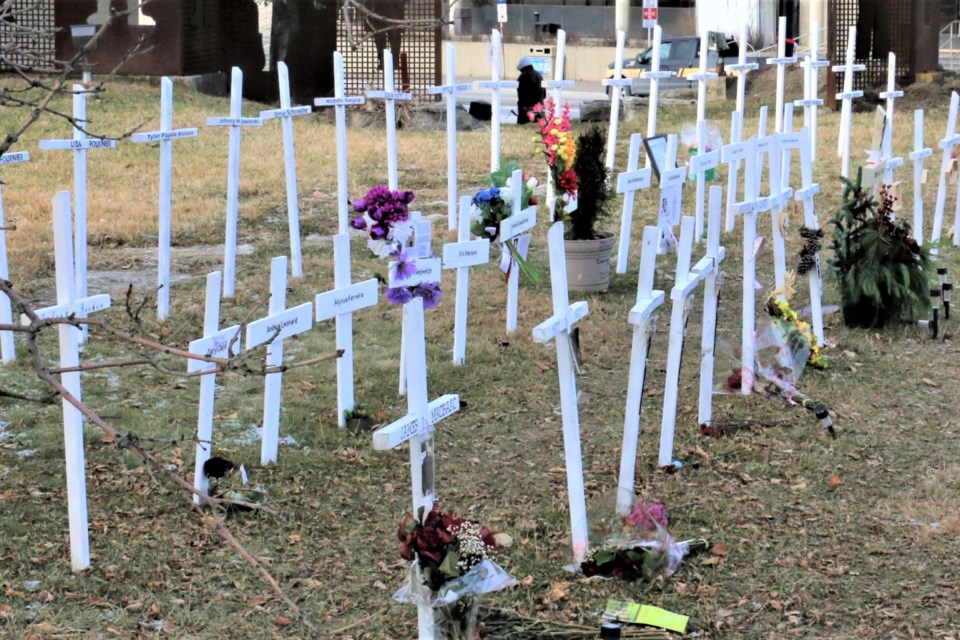In the early days of the pandemic, as the province rolled out its announcements on what would be deemed “essential services,” one thing really stood out: keeping the LCBO open for business.
The province courted controversy by doing so. But the rationale was solid and forward-thinking: closing off a safe supply of alcohol would send a significant percentage of the population into withdrawal. Some who were severely alcohol dependent may die; and others would overwhelm the already stressed healthcare system.
I recall Ontario’s Chief Medical Officer of Health Dr. Keiran Moore’s handling the delicate subject with aplomb: the province was prepared to be forthright regarding an often-hidden epidemic of alcohol dependency, all the more taboo given the drug’s social acceptability.
More thorny now is the province’s response to the opioid poisoning crisis. Long delays in approving supervised consumption sites (SCSs) have left communities dealing with rising body counts. The province doesn’t seem to be questioning the value of supervised sites, yet approving funding to sites isn’t forthcoming.
Then this past July, a stray bullet ended the life of an innocent bystander, a woman in the east end of Toronto: the outcome of an altercation between drug dealers outside South Riverdale Community Health Centre, which houses a SCS.
This tragedy is the kind of critical incident that deserves and demands questions about procedures and protocols so that while we save lives, we do our best to reduce the risk to others. This sad loss of life also gave ammunition to those who object to safe consumption sites as crime magnets — a view that study after study has refuted empirically.
By August, the province did respond to the South Riverdale incident by parachuting a supervisor of their choosing to take over operations. And at the same time, they hired a third-party consultant, Unity Health Toronto, to investigate the incident, scrutinizing the wisdom of hosting SCSs in community health centres, which offer an array of services from primary care to health promotion services to the public.
Michael Tibollo, associate minister of Mental Health and Addictions, never threatened that the province’s 17 currently fully funded SCSs would close during this investigation, as he acknowledged the obvious good SCSs have in reversing overdoses, providing counselling, making referrals, and other benefits including cost-savings.
The surprise, however, came in the form of a second related announcement in October, that the investigation into the critical incident at South Riverdale had prompted a broader review, and that SCSs that were pending provincial approval would be placed on hold until that investigation was concluded.
Here in Northern Ontario, with the highest rate of opioid deaths per capita, and with two pending sites left in the lurch (Timmins and Sudbury), this was a devastating blow. South Riverdale’s SCS remains operational and funded — where the fatal incident occurred — but here in Sudbury and in Timmins, the SCSs are soon to close as their current funding is temporary and provided by their respective municipalities.
What is the net health or cost benefit in delaying approving funding to already operational SCSs, as we have in Sudbury and Timmins?
The costs and risks are pretty apparent: death by overdose from among more of our friends, neighbours and family members; increase in the transmission of hepatitis, HIV and other infections in already vulnerable people; loss of both special and specialized staff to other jobs; more strain on emergency services, and more hospitalizations, and; more public drug use and drug paraphernalia litter in public and private spaces.
An argument could be made that the province would never consider shutting down bars (read: sanctioned consumption sites) or stop handing out new liquor licenses based on a violent incident outside a tavern.
The same would be true of shootings outside LCBOs (read: state-run drug dispensaries.) It’s hardly a scientific study: but google “LCBO” or “bar” with “shooting” and “Ontario” and any number of recent cases will come up.
So how much should we question the role that the stigma of illicit drug use and street drug users is affecting the Ontario government’s policy decisions? They have spoken of the importance of “public safety” in weighing how and where to implement supervised consumption sites, but why does it feel as though the users of the sites aren’t counted as members of the public, as being among those also needing safety?
Last week, I attended a vigil organized by citizens concerned that Sudbury’s supervised consumption site will soon close. It was heart-wrenching to listen to their stories.
There was a man who worked in SCS out west and came home after learning a close friend had overdosed here in Sudbury. A woman who lost her son to overdose spoke as well. A doctor working in the Sudbury centre, who also had lost loved ones to a drug overdose, came to the mic.
The sheer frustration of grappling with why Sudbury could not have what other cities had was palpable. Then, one of the original nurses who years ago started an unsanctioned overdose prevention site from inside a tent, came forward to speak. It was a powerful reminder to me of the immense courage, dedication and compassion that started Sudbury on a path towards a sanctioned site.
Could our government muster a fraction of the courage and compassion of the Northerners who have acted, sometimes at great risk to themselves, to extend this life-saving health care to others? Or, could the province simply channel its own spirit from March 2020 to set its course to lead in this opioid poisoning crisis by acting on health and addictions research, and dare I say follow common sense?
Beth Mairs lives in Greater Sudbury.
